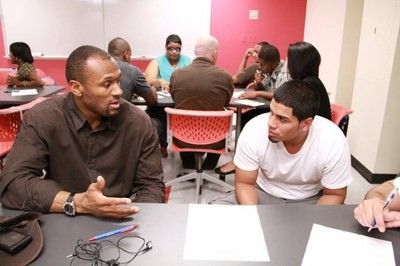Context
The challenge of facilitating positive reentry for people coming out of prison has become an urgent public policy priority. The size of the prison population underscores the scope of this challenge; as of 2008, 2.3 million people in the United States and over 70,000 in New York State were incarcerated. Nearly 95 percent of those incarcerated will return to communities across the country; over 650,000 people are released from federal and state incarceration in the United States each year (Second Chance Act of 2007, Bureau of Justice Statistics 2004). In 2008, African American males ages 18 and over represented only 5% of the total college student population but 36% of the total prison population. Policy makers and community advocates are grappling with the task of identifying effective strategies for reintegrating the thousands of men and women who return home from prison, jail, or Alternative to Incarceration (“ATI”) programs.

A substantial body of research suggests that education constitutes an effective strategy for reducing recidivism, increasing employment, and enabling returning community members to rebuild their lives, families and communities. This educational research suggests that programs which build the social capital and collective efficacy of formerly incarcerated students have considerable unexplored potential as strategies for enabling college access and success and, in the process, reducing recidivism and increasing pro-social behavior. It suggests that college access and success programs for the reentry population are likely to have multiple effects by virtue of their emphasis on increasing embeddedness in positive social networks as a core strategy. For the most part, that research has not been tapped by researchers and policy makers focused on the successful integration of students transitioning from the criminal justice system into college.
In New York City, a network has emerged in the last ten years to focus on building a pathway from criminal justice to college. This network focuses on rebuilding the lives of the over 70 thousand people who have fallen into the school-to-prison pipeline. These reentry organizations have identified higher education as a core strategy for reclaiming hope and possibility for people who have become enmeshed in the criminal justice system.
Project Description
The Center has formed a long term collaboration with the Reentry Education Network, College Initiative, and the Criminal Justice Initiative at Columbia University, to involved in providing post-secondary access and success for people with criminal justice designed to: (1) to document the collective impact of reentry education strategies on program participants and on the policies and practices of responsible criminal justice and educational institutions; (2) to systematically identify and analyze the mechanisms and strategies used to cultivate networks and social capital for the target populations, (3) to develop tools for assessing and building networks and relationships that increase access and success, (4) to share this information with a larger reentry education network in New York City and disseminate it nationally to stimulate increased attention to developing and researching effective postsecondary educational interventions., and (5) to increase the capacity of the member organizations and the Network to continue and expand their work.
Project Collaborators
The Center is collaborating with Reentry Education Network, a consortium of community based organizations, government agencies, and higher education institutions with the mission of building pathways to education for people with criminal justice histories, and to shifting public policy priorities from incarceration to education. The Center has formed a long term collaborative research relationship with College Initiative and its current and former leadership, Michael Carey and Benay Rubinstein. That work has been conducted in collaboration with Michelle Fine and the Public Sciences Project at CUNY Graduate Center. We are also partnering with the Criminal Justice Initiative, an organization led by Kathy Boudin and Cheryl Wilkins that aims to provide academic and professional training in the areas of incarceration and reentry for students at the professional graduate schools at Columbia University.
Project Resources
- Building Pathways of Possibility from Criminal Justice to College: College Initiative as a Catalyst Linking Individual and Systemic Change
- Susan Sturm, Kate Skolnick, and Tina Wu
